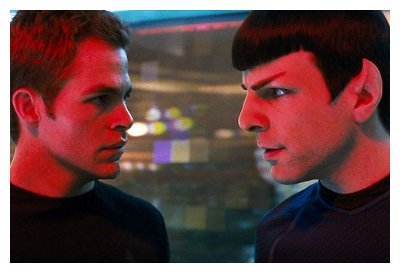Space: The Final Frontier
“I have been, and always shall be, your friend.”
In May last year, J.J. Abrams unveiled the second movie in his reboot of the Star Trek franchise. Coming four years after the first, Star Trek Into Darkness earned itself an 87% at Rotten Tomatoes and a 7.9 of 10 at the Internet Movie Database. It saw the main cast of Star Trek (2009) reprise their roles as the Alpha roster bridge crew on the USS Enterprise, joined by Benedict Cumberbatch as Khan Noonien Singh and Alice Eve as Dr. Carol Marcus. Launching a reboot is always walking a very fine line: appeasing existing fans (of which Star Trek has plenty) yet not cloning the original, and J.J. Abrams has, so far, managed to (despite a few cliches, a few parallels drawn completely upside down, and more lens flares than strictly necessary) pull it all off admirably.
Star Trek is an almost cult phenomenon, and even decades after its launch, is extolled as of the most the iconic television shows ever made. The philosophy behind the franchise runs deep, and is spearheaded by Gene Roddenberry’s bold starting move of populating the bridge of the flagship of an armada with a female chief of communications of African descent, a chief helmsman of Asian descent, a Russian navigator, a Scottish chief engineer, and, most importantly, an alien Executive Officer, on a television show premiering in 1960s America. Binary expressions of gender were outdated, having expanded to include a plethora of pronoun preferences, and bigotry (especially stemming from xenophobia) was openly condemned, the most important theme being finding a place of belonging. One of the chief facets of the show was to showcase a platform where everyone, regardless of skin color, native country – or indeed, planet – and gender was welcomed and valued – and much as this was the source of not a little controversy, back in the day, it was also one of the franchise’s prime selling points. This cardinal vein of societal progress, manifested through the obvious, yet clearly genuine, camaraderie amongst characters from different backgrounds and cultures, has been religiously retained in the reboot.
Featuring a flourishing future, where humans are the seat of the galactic organization, the United Federation of Planets, and where poverty and depression are more or less extinct, Star Trek‘s fulcrum is the epic friendship (dubbed as a bromance; the first ever widely shipped homosexual pairing) between Captain James Kirk and his First Officer, Commander Spock. The characters have been canonized for both their virtues and their faults, and illustrate our hope for a utopian future, not by virtue of the technology they possess (for all the show belongs in the science fiction genre), but because of their humanity: our capacity for compassion, courage, humility and hope. Characters strive to be better people, and moral and ethical struggles were as common as personal ones: there are things more valuable than money, there are people more valuable than pride; how often will you forget that your rights are subject to the requirements of the service; with how clear a conscience can you condemn one man to death for the good of many.
James Kirk is charismatic and bold, well-suited to a position of command, and yet unable to ever give it up. A staunch disbeliever in no-win scenarios, his ingenuity in solving them is harshly tested frequently (and fatally). Jovial and stern as the situation requires, he is respected by his peers, his underlings and his superiors, and is lauded throughout the galaxy as a great man. Spock is half Vulcan, half Human, too Vulcan for the Humans, too Human for the Vulcans. In the middle of a twenty-year-long, rather frosty gap in communications with his father, he is, nevertheless, compassionate and loyal, both to a fault. Having been brought up in a culture that placed nothing in greater esteem than logic, yet never finding acceptance from his own people, by virtue of his human genes, for Spock, his commission on the Enterprise means a life void of discrimination and prejudice. This friendship between Kirk and Spock defines them both, and grew to be the most important relationship either of them would ever have.
With lofty ideals, complex characters, a passionate and demanding fandom, and rather limited screen time to contend with, J.J. Abrams has, nevertheless, created two spectacular movies, with enough variation so as to not appear fake, and yet, enough similarity so as to be truly authentic. The casually intense chemistry between Chris Pine (Jim Kirk) and Zach Quinto (Spock) made for a slightly different, but fundamentally sound friendship between their characters. Zoe Saldana pulled off a stunning Nyota Uhura, Karl Urban played a genuine Dr. McCoy, John Cho was an audacious Hikaru Sulu, Simon Pegg (Scotty) never failed to entertain, and Anton Yelchin (all of nineteen in the first movie) managed a fantastic Pavel Chekhov.
Given that the reboot is a series of movies, character development is, understandably, rather fast-paced, and, given that the series follows an alternate timeline, certain situations are drastically different from those in the original series. In keeping with the populace’s current preference for renegade protagonists, the characters are all more intrepid and flamboyant. The fates (and relationship statuses) of not a few characters are vastly different. Despite these perceived flaws, both the new Star Trek movies are full of action, fully accepting of the ideologies of franchise’s creators, and entertaining enough to appease the fans.
One vital part of the new series is the vast leap in technology – both available and visualized – in the intervening fifty years. The special effects are blooming, the technology the original creators had conceptualized has evolved, been improved upon, and fantastically rendered. The Enterprise herself is nothing short of gorgeous. To us, in this era, the original series has little to nothing to offer by means of fantasizing the possibilities of times to come (I watched the show solely for the characters and the plot and the principles behind them). The cinematography and VFX in the movies has indeed remedied this.
Worth watching for a myriad reasons, once you do, this franchise will almost certainly change you – be it instilling a deep desire for space-travel, or a resolution to be kind and honorable at all times, or a compulsion to intone “Live long, and prosper” at every opportunity. It did all three for me.
Space: the final frontier. These are the voyages of the starship Enterprise. Its ongoing mission: to explore strange new worlds, to seek out new life and new civilizations, to boldly go where no man has gone before.




